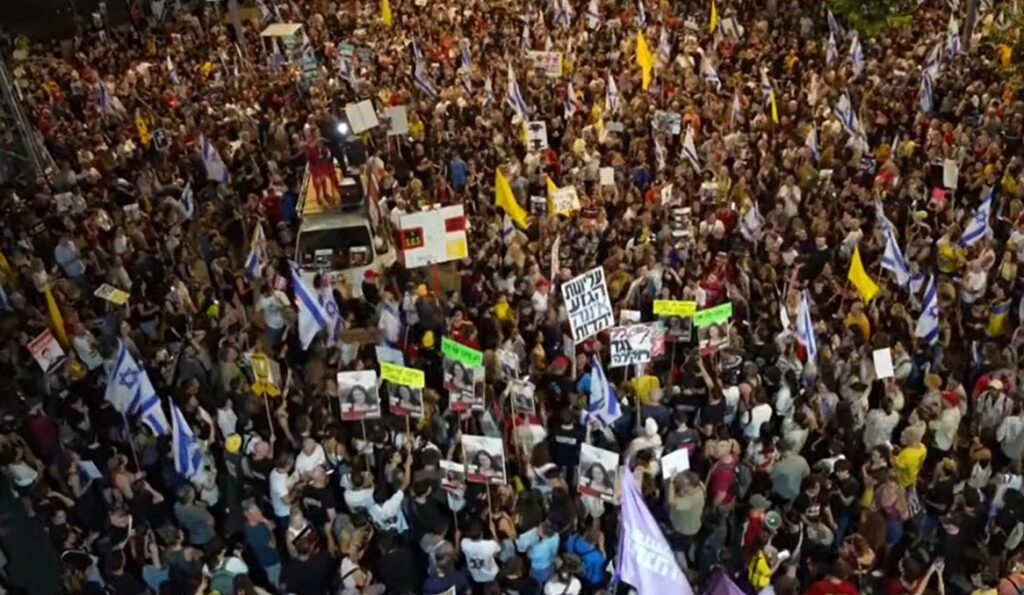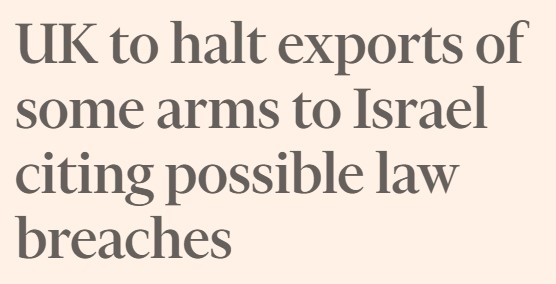By John Pickard
The general strike in Israel today is a harbinger what will be a long, drawn-out crisis in the Israeli state. The genocidal war conducted in Gaza and the increasing pogroms against Palestinians in the West Bank, by both settlers and the IDF, have sent politicial shock waves around the world, but they are also resulting in the most bitter and intense conflicts between Israelis since that state was founded seventy six years ago.
The strike came about as a result of the pressure from the families of the Israeli hostages still held by Hamas. The retrieval of six more bodies of hostages in the last few days ignited protests at a far higher level than ever before. There is a general percecption in Israeli that although Hamas may be directly responsible for the murders of the six, it is also due to its intransigence that the Israeli government also has blood on its hands.
Apart from those on the far right of Israeli society, the popular opinion in Israel is that Netanyahu is prolonging the war as long as possible – and threatening to broaden it to include Hezbollah in the North and also widening the conflict in the West Bank – solely in order to hang onto power. Netanyahu is facing a trial and possible jail time over corruption, but as long as he can wear the cloak of ‘Mr Security’ and stay in office, he can avoid prison.
However, the waves of opposition to him have now grown so big that it is possible that they might finally remove him from power.
Hundreds of thousands on strike
It was only under pressure from political leaders, that the head of the Israeli trade union federation, the Histraduth, which is as much a bastion of the zionist state as most political parties, also called on its members to strike at least for a day. But in reality, the strike was already well under way before the trade union ‘leaders’ spoke up.
So in Israel today there were few trains running and few buses; the main Ben Gurion airport closed. Civil servants were not at work, and neither were teachers, health workers, shop-workers, university workers or local government employees. As a result of the pressure of public opinion, even employers’ organisations backed the call for a strike, hoping, of course, that it would be only for a day. The Manufacturers Association accused the government of failing in its “moral duty” to bring the hostages home.

The Israeli Business Forum, which represents most private sector workers from 200 of the country’s largest companies, supported the strike. Workers in Israel’s powerful tech sector walked out. The head of the Israeli Bar Association, called on “all lawyers” to go on strike.
Right-wing Israeli ministers reacted as would be expected, and they appealed to the Israeli labour court to declare the strike ‘illegal’ on the grounds that it was a ‘political’ strike – which the court duly did. But although the court determined that the strike should end at 2.30 in the afternoon, and the Histraduth had ‘formally’ agreed to abide by the decision, in practice, tens of thousands of workers ignored it.
With hundreds of thousands taking to the streets, blocking main roads around Tel Aviv, these are some of the biggest demonstrations in Israel’s history, and they will not be swayed by the labour court. The discovery of the bodies of the six latest hostages has created a sense of rage against the government, which is seen to be pursuing an impossible ‘total victory’ against Hamas, whatever the cost.
“the sense of crisis in Israel is palpable”
A relative of one of those recently killed told a BBC correspondent that the six had been part of a ceasefire deal offered by Hamas, but declined by Netanyahu., “All six of them were held together”, he said, “We could have saved all of them.” Israelis are well aware that apart from the 105 hostages released as part of the temporary ceasefire last November, the IDF have rescued only eight others, as well as accidentally killing three more who were trying to surrender to them.
“The fate of the hostages”, the BBC correspondent wrote, “is tearing the country apart…the sense of crisis is palpable.”
As a result of the bombardment and devastation of Gaza, resulting in over 40,000 deaths, the big majority of them women and children, Israel now is a pariah state across the world, if not among the political class, which continues to apologise for Netanyahu, then certainly among the majority of workers and youth. The overwhelming ‘military’ victory over Hamas will come to be eclipsed by the biggest world-wide political and diplomatic setback in Israel’s history.

It is only the restraint – and outright repression – by Arab leaders in Egypt, Jordan and the Gulf states that has prevented a generalised upheaval among Arabs who feel a natural affinity for Palestine. They have seen the genocide on Al Jazeera every day on TV in their homes. It is only the fear of a new mass uprising among Arabs – a new ‘Arab Spring’ – that is gradually pushing western governments into opposition to Israel’s policy in Gaza and into support for a ceasefire.
The pogromists and racists on Israel’s far right are pursuing a deliberate policy of ethnic cleansing, as far as they can get away with it. Left to them, the two and a half million Palestinians in Gaza would be completely driven out of Gaza and into Egypt, leaving the Gaza strip to be incorporated into Israel. “Netanyahu’s war goal”, Aluf Benn wrote in Haaretz, a more liberal Israeli newspaper, on August 21, “Is not the hostages’ return. It’s the occupation of Gaza”
Turning parts of the West Bank into another Gaza
The Israeli right are openly fostering a similar policy on the West Bank. They have unleashed unprovoked attacks, ‘pogroms’ to use the proper word, on Arab villages and towns, by armed Jewish settlers. It is this policy of the Israeli right that is, in effect, being put into practice in the West Bank by the IDF.
The aerial bombing of refugee camps and parts of the West Bank are a parallel, albeit on a smaller scale, to what has been done for eleven months to Gaza. Even the Guardian reports the IDF using children as ‘human shields’ in their attacks on the Jenin refugee camp.
Since October 7, settlers and the IDF have been given a free hand in the West Bank and over six hundred Palestinians have been killed, with more than thousand interned without trial. It is the height of hypocrisy for the IDF to claim they are focusing on ‘terrorists’ in Arab cities, while they allow Jewish terrorists free rein elsewhere on the West Bank.
The far right in Israel, and the settlers especially, are well armed. ‘Security Minister’ Ben Gvir distributed thousands of rifles to settlers in the weeks after the Hamas attack on October 7. These people do not have a political majority in Israel, but they have a political weight disproportionately larger than their support on the ground. What is more important is that they would fight, literally – including against other Israelis – to drive forward their programme of ethnic cleansing and genocide.
The policy of apartheid in Israel is an unsustainable illusion
On the other hand, there is a large part of Israeli society that does not accept the programme of the far right. The constant refrain of ‘security through strength’ has led to the massacre in Gaza and is stoking the flames of resistance by the Palestinians population of the West Bank. It has led to Israel becoming an international by-word for brutality and inhumanity.
The ongoing construction of an apartheid state – which has been ongoing for two decades – is a dead end for Palestinians and Jewish Israelis alike, and more of the latter are now going to realise that. Nothing can continue as it was before.
Even the head of Shin Beth, the Israeli internal security agency, warned in a letter to politicians last month that “Jewish terror” – he was alluding to the pogroms by settlers against Arab villagers – “is a danger to the state’s existence, constitutes a flashing warning light” (Haaretz, August 25). His letter caused outrage among some government ministers, but its wide circulation in Israel will add to the disintegration of old political ideas and prejudices.
It is no compensation for Palestinians, either under constant siege in the West Bank, or destitute and starving in the rubble of Gaza, for Israelis to be at each others’ throats. But neither will it do their cause any harm, because what is happening in Israel will undermine the illusion that apartheid is a sustainable policy or that it offers a safe and secure future for Israelis.
The whole Middle East is a tinderbox, and a central element of that instability is the denial of national, political and economic rights to Palestinians. Workers and youth around the world have already come to that conclusion, but political leaders generally and even Israelis are also being forced by events to arrive at the same conclusion. There can be no ‘safe haven’ for Jews, or ‘peace’ in Israel, as long as the rights of Palestinians are trampled into the dirt, and the more and the sooner Israeli workers realise that, the better.
[Top picture and picture from Israel are from the newsfeed of Al Jazeera]



